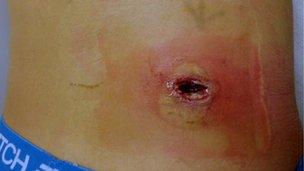False widow spider bites footballer Steve Harris
- Published

Steve Harris said: "I was in agony. I have never had pain like that before."
An amateur footballer from Devon has been sidelined after being bitten by Britain's most venomous spider.
Team-mates of Elmore Football Club player Steve Harris thought he was joking when he pulled out of the squad because of the injury.
But the 22-year-old had been bitten in his sleep by a false widow spider and had to undergo an emergency operation at Torbay Hospital.
The defender now has an open wound where surgeons cut away the poison.
Mr Harris, from Dawlish, who turns out for the Tiverton-based side in the South West Peninsula Premier League, has been told he cannot play football for at least three weeks.
He said: "When I woke up I had a pain in my side - a stinging feeling. I didn't take that much notice until it started swelling and the pain got worse.
"The area around the bite mark just ballooned and grew and grew.
"It was only when the area started to turn black, some four days after I first noticed the bite, that I decided I ought to go to hospital."
Torbay Hospital said Mr Harris was first seen by his GP who diagnosed the spider bite and told him the surgery had seen six similar bites in the previous week.
"They told me the false black widow spider was the culprit," Mr Harris said.
"They operated on me immediately and it took half an hour to cut away the area around the bite to get at the poison. I now have an open wound and have to wait for it to heal over.
"I was in agony. I have never had pain like that before in my life. It's still very painful now. I still can't sleep properly and find it virtually impossible to get in and out of a car."
Fruit crates
In his teens he had spells at Plymouth Argyle, Norwich City, Yeovil Town and Salisbury, and joined Elmore two years ago.
His friends still thought he was pulling their leg and it was only when he showed them a photo of his wound that they believed him.
The false widow spider (steatoda nobilis) is the most dangerous of the 12 species of biting spider known in Britain.
It is thought to have arrived in Britain in crates of fruit from the Canary Islands in the late 19th Century, with the first reported sighting in Torquay in 1879.
There have been no reported deaths from its bite in the UK.
The spider, which is about the size of a 50p piece, belongs to the same family as the infamous black widow, although it is nowhere near as toxic.

Surgeons cut away the area around the bite
The severity of symptoms depends on the amount of venom injected but can include severe swelling, chest pains and tingling of fingers.
The Natural History Museum said a succession of mild winters had resulted in a significant increase in the number of reported sightings and bites.
Conservationists believe that changes in climate could be encouraging the spider to make itself at home in new areas.
Buglife , externalentomologist Steven Falk said false widow spiders were "ponderous, very slow moving and not at all aggressive".
However, without "hard evidence" he said it was difficult to know how many bites - including Mr Harris's - they were responsible for and how many could be attributable to other insects, such as mosquitoes.
- Published4 October 2013
- Published15 October 2012
- Published30 August 2012